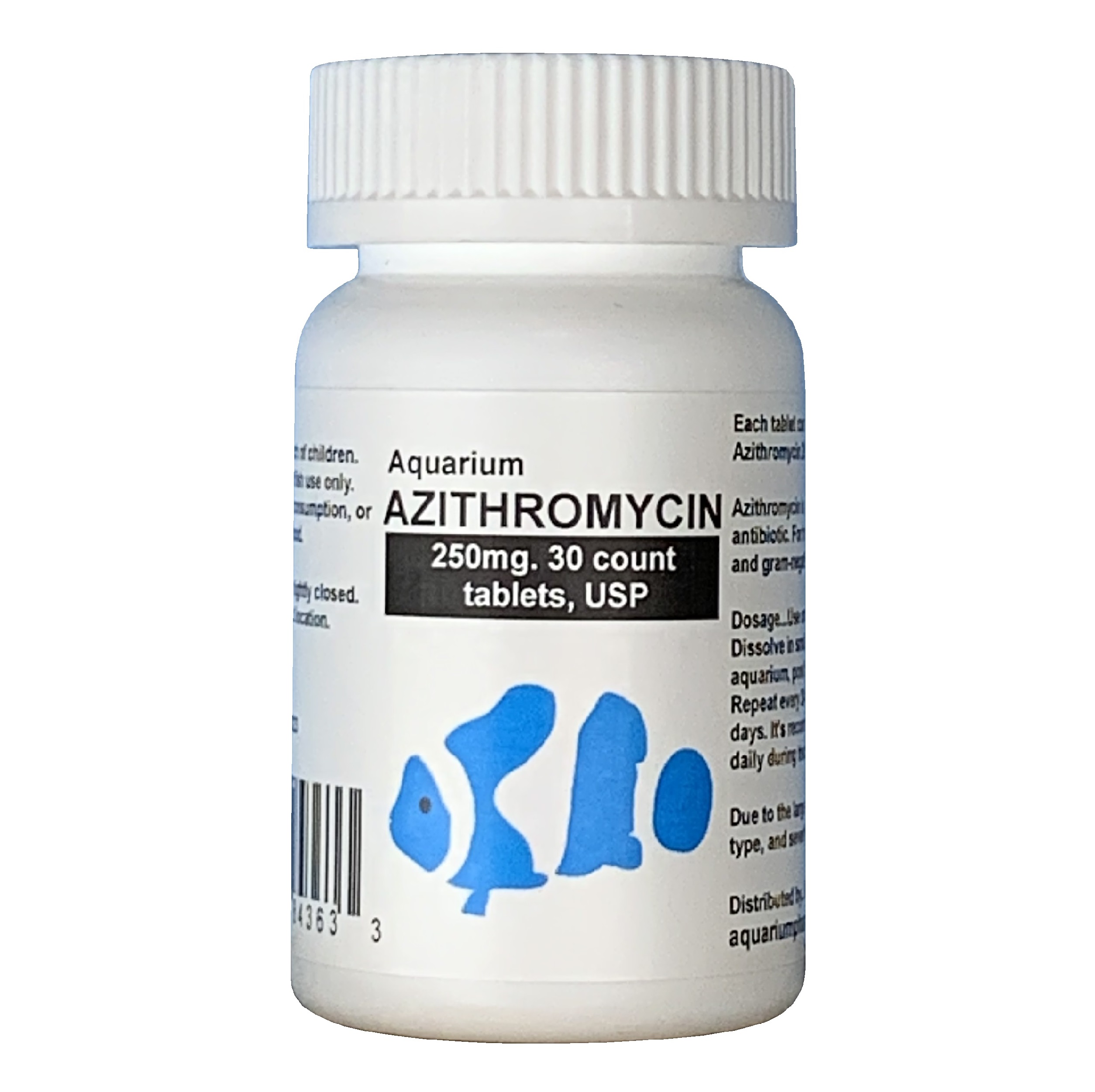
Fish azithro. best price still available today.
-
Fish azithro. best price still available today.
Posted by Michale5349 on June 29, 2023 at 2:38 pmFish zithro is still available to order here today. Best price I found.<div>
https://www.calvetsupply.com/aquarium-azithromycin-250mg–30-tablets.html
</div>
-
This discussion was modified 1 year, 5 months ago by
 Michale5349. Reason: Auto correct sucks
Michale5349. Reason: Auto correct sucks
calvetsupply.com
Aquarium Azithromycin- 250mg - 30 tablets-KD-10026
Aquarium Azithromycin- 250mg - 30 tablets-KD-10026
PaulAtreides replied 1 year, 3 months ago 5 Members · 7 Replies -
This discussion was modified 1 year, 5 months ago by
-
7 Replies
-
I’ll put my two cents in here just so folks know:
1) Antibiotics for animals are the same as for humans EXCEPT for everything that isn’t the actual antibiotic. The fillers, binders, and any additives may not be suitable or healthy for humans. Animal antibiotics are not regulated in the same way as human antibiotics.
2) Antibiotics, especially synthetic antibiotics are highly ineffective against antibiotic-resistant bacteria. All pharmaceutical antibiotics are based on the idea that the singular antibiotic component is what kills bacteria. Unfortunately, bacteria have about half a dozen ways in which they learn how to isolate and become resistant to the antibiotic and then actually pass this information on to other bacteria. Even viruses carry this information to bacteria.
3) Plants that have antibiotic properties contain the same antibiotic chemicals synthetic antibiotics are designed to emulate, but they also contain up to 200 other properties and constituents that disable the resistance of the bacteria. Bacteria can resist one chemical component but not dozens, enabling the original antibiotic in the plant to kill the bacteria. In essence, the bacteria was not resistant to the antibiotic – it was simply more able to resist the antibiotic when it was isolated and not protected by and delivered by the other components it needed to work properly.
That said, while I am not opposed to using animal antibiotics in an emergency or having an emergency store of them as they may, at some time, be the only way to get an antibiotic when needed, I highly recommend a knowledge and store of antibiotic plant medicines. The book Herbal Antibiotics by Stephen Buhner is absolutely amazing but IMHO real overkill when it comes to the dosages. For example, each bacterial illness requires, from his perspective, a rather complicated series of medicines in very specific dosages, I use that information as a starting point for further research to simplify (as a good herbalist will do – SIMPLIFY). One example is MRSA which can be more easily treated with grated burdock root and dandelion leaf. I would definitely do more than that, but burdock root and dandelion leaves flush out the lymphatic system quickly giving the bacteria almost no ground in which to survive and replicate and spread. Just taking an antibiotic, synthetic, natural, or plant based may not be enough. First flushing the lymphatic system and then supporting health with a plant based antibiotic would be a more effective strategy.
So I recommend a sound knowledge of how bacteria work, how they learn, what plants may grow near you that are effective whole antibiotics, and how to get ahold of a good herbalist besides stocking up on unregulated antibiotics. Start with folk medicine. It’s more likely to work than even modern herbalist methods which are based more on pharmacology of dried plants than a knowledge of the whole plants themselves and our healing history as humans.
-
I have recently started an herb garden. In your opinion what are the best herbs to have on hand to take care of different illnesses.
-
It kind of depends on what illnesses you might want to be prepared to treat. There are great remedies and treatment options for mild to serious respiratory illnesses, arthritis, skin rashes and reactions, osteoporosis, heart disease, nervous disorders, immune support, cancers, digestive problems, parasites and poisons, male and female issues. But while I have or can forage for most of those (and please feel free to give me a specific list of illnesses or conditions you want to grow for, my main concern has been to create a supply for medicines that can treat or cure major pathogens that might be “dumped” on us, such as Marburg and other hemorrhagic fevers, malaria, HIV, MRSA, smallpox, etc. I would say, if you want to have some heavy hitters on hand, buy 1-2 ounces of Osha tincture. You won’t grow it, likely, and it’s already being harvested into the endangered zone, but just a couple of drops can treat severe allergic reactions and anaphylactic shock – helpful for when you don’t have an Epi-pen handy, which few people do. I would also carefully make pokeweed root tincture (wear gloves when working with the root and never eat poke raw and never eat or taste the root). It’s the tincture one takes when things look bad and you’re considering antibiotics which probably won’t work anymore anyway, including SARS exposure, HIV, anthrax, and more. Yarrow (white flowering tops) tincture and salve are both antibiotic. I would also make sure to have artemisia annua for SARS, malaria, hemorrhagic fevers (yellow fever, Marburg, ebola). Pitcher plant treats smallpox. Pleurisy root (butterfly milkweed) treats scarlet fever and all pneumonias and respiratory infections. Usnea treats MRSA but so does grated burdock root and dandelion leaves (eaten). C19 is a vascular disease, not a respiratory disease, so you want blood thinning plant medicines such as willow bark. Also C19 and the jab destroys all bifidobacteria in the gut biome so you want to eat fermented foods and only 3 out of 27 products from Whole Foods (including kefir) that list bifidobacteria in ingredients actually had it. 24 did not have any and you need to repopulate your gut biome as bifidobacteria is essential for a functioning immune system.
-
-
Thank – You for this. What book or books should I use for reference to folk medicine , and herbal plant antibiotics and medicines ?
-
To understand how to work with plants and make medicines from them, I would start with Healing Wise by Susun Weed. It only highlights 7 plants, but it goes into such detail, it gives you an excellent view of how to approach plants you might be interested in working with. Then I would get a good field guide for your area as most plants can’t be found in stores or grow in gardens but are available in local fields and forests. Making Plant Medicine by Richo Cech is great but I don’t agree with some of his preparation methods as I come from a very different line of thinking regarding application of herbal medicines, but he’s very thorough and knows his stuff. You might want to watch the YouTube video channel She Is Of The Woods with April Graham. She teaches all about plants and how to make medicines from them simply and understandably. I don’t really do herbal books, per se, because they are all so contradictory. I learn by comparing info from many sources and using the plants myself. A couple of good ones though are both volumes of A Modern Herbal by Mrs. M Grieve and surprisingly, The Lost Book of Herbal Remedies which I thought would be terrible but gives some good basic info in a completely understandable way. Stephen Buhner’s Herbal Antibiotics and Herbal Antivirals are very comprehensive and really overkill (no pun intended) as the treatment combinations are super specific and almost impossible to create, but he explains a lot of the science of infection, viruses and antibiotics and it’s worth it for that.
-
BTW, there’s an old book out called Folk Medicine by a Vermont doctor D.C. Jarvis MD. It’s old but goes back to some down-home stuff you don’t hear about anymore.
-
Thank you for this recommendation. I was able to get this book. Because of the medical tyranny going on I’m growing many herbs and medicinals and ways to make tinctures, salves and getting equipment to make everything we can. I finally weaned myself off the last one and we go to a naturopath who is extremely antivax with none of his 5 kids ever receiving any vax since birth
-
-
Log in to reply.


